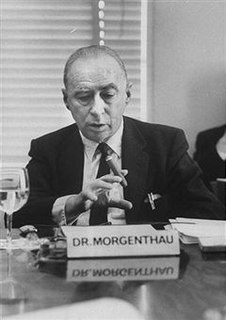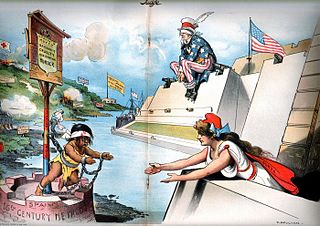Neorealism or structural realism is a theory of international relations that emphasizes the role of power politics in international relations, sees competition and conflict as enduring features and sees limited potential for cooperation. The anarchic state of the international system means that states cannot be certain of other states' intentions and their security, thus prompting them to engage in power politics.

The Embargo Act of 1807 was a general trade embargo on all foreign nations that was enacted by the United States Congress. As a successor or replacement law for the 1806 Non-importation Act and passed as the Napoleonic Wars continued, it represented an escalation of attempts to coerce Britain to stop any impressment of American sailors and to respect American sovereignty and neutrality but also attempted to pressure France and other nations in the pursuit of general diplomatic and economic leverage.

International relations (IR), international studies (IS) or international affairs (IA) is the scientific study of interactions between sovereign states. In a broader sense, it concerns all activities between states—such as war, diplomacy, trade, and foreign policy—and relations with and among other international actors, such as intergovernmental organisations (IGOs), international non-governmental organisations (INGOs), international legal bodies, and multinational corporations (MNCs).
International relations theory is the study of international relations (IR) from a theoretical perspective. It seeks to explain causal and constitutive effects in international politics. Ole Holsti describes international relations theories as acting like pairs of coloured sunglasses that allow the wearer to see only salient events relevant to the theory; e.g., an adherent of realism may completely disregard an event that a constructivist might pounce upon as crucial, and vice versa. The three most prominent schools of thought are realism, liberalism and constructivism.

Hans Joachim Morgenthau was one of the major twentieth-century figures in the study of international relations. Morgenthau's works belong to the tradition of realism in international relations theory, and he is usually considered among the most influential realists of the post-World War II period. Morgenthau made landmark contributions to international relations theory and the study of international law. His Politics Among Nations, first published in 1948, went through five editions during his lifetime and was widely adopted as a textbook in U.S. universities. While Morgenthau emphasized the centrality of power and "the national interest," the subtitle of Politics Among Nations -- "the struggle for power and peace" -- indicates his concern not only with the struggle for power but the ways in which it is limited by ethics, norms, and law.

The Paul H. Nitze School of Advanced International Studies (SAIS) is a division of Johns Hopkins University based in Washington, D.C., United States, with campuses in Bologna, Italy, and Nanjing, China. It is consistently ranked one of the top graduate schools for international relations in the world. The institution is devoted to the study of international affairs, economics, diplomacy, and policy research and education.
Robert L. Gallucci is an American academic and diplomat, who formerly worked as president of the John D. and Catherine T. MacArthur Foundation. He previously served as dean of the Edmund A. Walsh School of Foreign Service at Georgetown University, from 1996 to June 2009. Prior to his appointment in 1996, for over two decades he had served in various governmental and international agencies, including the Department of State and the United Nations.
United States non-interventionism primarily refers to the foreign policy eventually applied by the United States between the late 18th and the first half of the 20th centuries whereby it sought to avoid alliances with other nations to prevent being drawn into wars not related to direct territorial self-defense. Neutrality and non-interventionism found support among elite and popular opinion in the United States which varied depending on the international context and the country's interests. At times, the degree and nature of this policy was better known as isolationism, such as the period between the world wars. Due to the Cold-War subsequent to the Second World War's end, and the rise of the United States as global super power, its traditional foreign policy turned into a diplomatic and military interventionism, engaging or somehow intervening in virtually any overseas armed conflict ever since; and concluding multiple bilateral and regional military alliances, chiefly the North Atlantic Treaty Organisation (NATO). A non-interventionist policy has continued to be claimed by some American figures and people since the mid 20th century, mostly regarding specific armed conflicts like the Vietnam and Korean wars or the more recent Syrian Civil War.
Idealism in the foreign policy context holds that a nation-state should make its internal political philosophy the goal of its conduct and rhetoric in international affairs. For example, an idealist might believe that ending poverty at home should be coupled with tackling poverty abroad. Both within and outside of the United States, American president Woodrow Wilson is widely considered an early advocate of idealism and codifier of its practical meaning; specific actions cited include the issuing of the famous "Fourteen Points".

Realism is one of the dominant schools of thought in international relations theory, theoretically formalising the Realpolitik statesmanship of early modern Europe. Although a highly diverse body of thought, it is unified by the belief that world politics is always and necessarily a field of conflict among actors pursuing wealth and power. The theories of realism are contrasted by the cooperative ideals of liberalism.
Robert David English is an American academic, author, historian, and international relations scholar who specializes in the history and politics of contemporary Eastern Europe, the USSR, and Russia. He is an associate professor of International Foreign Policy and Defense Analysis at the University of Southern California School of International Relations.

The Monroe Doctrine was a United States foreign policy position that opposed European colonialism in the Western Hemisphere. It held that any intervention in the political affairs of the Americas by foreign powers was a potentially hostile act against the U.S. The doctrine was central to U.S. foreign policy for much of the 19th and early 20th centuries.
Liberal institutionalism is a theory of international relations that holds that international cooperation between states is feasible and sustainable, and that such cooperation can reduce conflict and competition. Neoliberalism is a revised version of liberalism. Alongside neorealism, liberal institutionalism is one of the two most influential contemporary approaches to international relations.

The Empire of Liberty is a theme developed first by Thomas Jefferson to identify the responsibility of the United States to spread freedom across the world. Jefferson saw the mission of the U.S. in terms of setting an example, expansion into western North America, and by intervention abroad. Major exponents of the theme have been James Monroe, Andrew Jackson and James K. Polk, Abraham Lincoln, Theodore Roosevelt, Woodrow Wilson, Franklin D. Roosevelt, Harry Truman, Ronald Reagan, Bill Clinton, and George W. Bush.

History of United States foreign policy is a brief overview of major trends regarding the foreign policy of the United States from the American Revolution to the present. The major themes are becoming an "Empire of Liberty", promoting democracy, expanding across the continent, supporting liberal internationalism, contesting World Wars and the Cold War, fighting international terrorism, developing the Third World, and building a strong world economy with low tariffs.

Classical Realism is an international relations theory from the realist school of thought. Realism follows the assumptions that: states are the main actors in the international relations system, there is no supranational international authority, states act in their own self-interest and states want power for self-preservation. Classical realism can be differentiated from the other forms of realism since it places specific emphasis on human nature and domestic politics as the key factor in explaining state behavior and the causes of inter-state conflict. Classical realist theory adopts a pessimistic view of human nature and argues that humans are not inherently benevolent but instead they are self-interested and act out of fear or aggression. Furthermore, it emphasizes that this human nature is reflected by states in international politics due to international anarchy.

Arnold Oscar Wolfers was a Swiss-American lawyer, economist, historian, and international relations scholar, most known for his work at Yale University and for being a pioneer of classical international relations realism.
The Washington Doctrine of Unstable Alliances, sometimes called the caution against entangling alliances, was an early realist guide for US foreign policy and the nation's interaction with others. According to the policy, the United States should consider external alliances as temporary measures of convenience and freely abandon them when national interest dictates. The policy has been cited as a rare example of an explicit endorsement of what in international relations is known as renversement des alliances, a state abandoning an ally for an alliance with a recent enemy, sometimes against the former ally.
This bibliography of Woodrow Wilson is a list of published works about Woodrow Wilson, the 28th president of the United States. For a more comprehensive listing see Peter H. Buckingham, Woodrow Wilson: A bibliography of his times and presidency.
The foreign policies of Canada and its predecessor colonies were under British control until the 20th century. This included wars with the United States in 1775-1783 and 1812–1815. Economic ties with the U.S. were always close. Political tensions arose in the 19th century from anti-British feeling in the U.S. in the 1860s. Boundary issues caused serious trouble in the 1840s over the Maine boundary and early 1900s, in the early 20th century over the Alaska boundary, and in recent years over the Arctic. Relations have been friendly with the U.S. in the 20th and 21st centuries.









